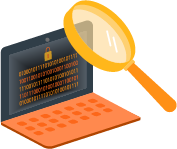When we talk about 5G, all we’re really talking about is a generation. At its simplest, 5G is the fifth generation of cellular technology. Without getting too much into it, 1G was the original cellular technology. 5G is the fifth-generation technology standard for cellular networks, which cellular phone companies began deploying worldwide in 2019, the planned successor to the 4G networks which provide connectivity to most current cell phones.
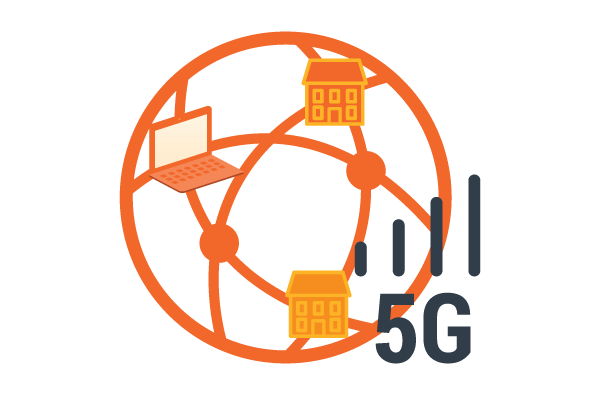
5G wireless technology is meant to deliver higher multi-Gigabit per second peak data speeds, reduced delays in response time, more reliability, massive network capacity, increased availability, and more immersive experience to more users. Higher performance and improved efficiency empower new user experiences and connect new industries.
There is no question that the way we work is changing. Inc.com wrote about a study that shows 62 percent of employees work remotely at least part-time. That's partly due to the way companies are trying to attract the best talent, regardless of where they are located, but also because of advancements in technology that allow workers to stay connected with their teams. Those changes have real benefits to businesses and employees, from increased productivity, greater profitability, and a happier workforce. Now, with the coming 5G revolution, remote work is no longer a niche trend but will become the way we work.
5G technology is perfect for future work because:
- It allows bigger channels (meaning your data can move faster)
- Has lower latency (a more responsive connection)
- Connects more devices at the same time (this could lead to more smart homes. Or, just more people streaming their favorite shows on different devices at the same time).
The Importance of 5G for Remote Office Work
5G Will Facilitate Better Business Communications
As the 5G network makes higher connection speeds and reduced delays in data transmission a reality, it will bring about significant improvements in communication. The faster speeds and greater network efficiency will make communication a breeze, while the lower latency will significantly improve response time. Therefore, 5G will facilitate high definition video calls and faster teleconferencing among remote workers.

5G will allow employees to collaborate using the latest technologies such as virtual reality and 3D holograms. These networks will introduce faster response speeds, allowing remote workers to collaborate in a more interactive and intuitive manner. Construction industry specialists, for instance, could collaborate on a high-level Building Information Model (BIM) of their projects, with real-time updates in case of project changes. 5G will revolutionize business communications by allowing immersive and instantaneous collaboration over remote tools.
Additionally, the mobile network is expected to offer mobile internet speeds of more than 10 gigabits per second (Gbps), which is about a hundred times faster than the 4G can provide. 5G technology will, therefore, allow for instantaneous communication and collaboration between colleagues and the head office. Faster communication will also enable instantaneous customer contact, which will help companies improve service delivery.
5G will also improve workflows through enhanced collaborative interaction. It has the capacity to facilitate Virtual Reality and Augmented Reality presentations. 5G networks come with large network bandwidths and reduced delays in response, which would be crucial to having a high-resolution collaborative meeting between colleagues. Additionally, 5G supports data speeds and bandwidths needed to access data in the VR and AR environments. Remote teams could, therefore, collaborate on creating a product from different locations, supported by a high-speed connection to a critical application.
The strong connection offered by 5G networks will also allow remote employees to interact with critical company applications seamlessly. The reduced latency will eliminate a lot of inconveniences associated with current remote access. 5G will allow remote workers to work on a project, make changes and communicate the changes to colleagues in real-time. 5G networks will, therefore, play a crucial role in improving workflows for the remote workforce.
The Internet of Things
5G technology has the capability to unleash the full potential of the Internet of Things (IoT). According to Ericsson, we will have around 20 billion connected devices by the end of the year 2020, and this will be augmented by 5G’s large network bandwidth. With these connections, you can boost the future of remote work using such resources as smart conferencing, office automation, and the use of Artificial Intelligence to ease work schedules.
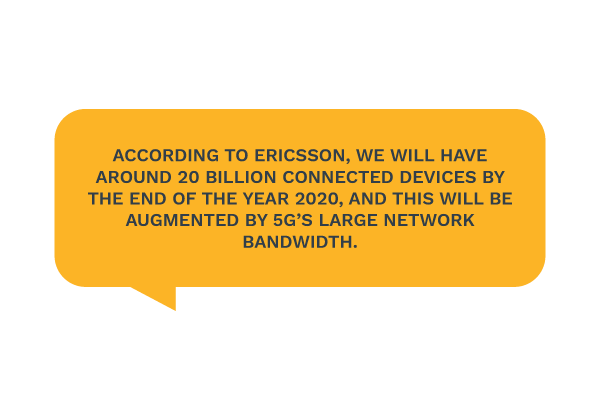
5G will change the logistics and transport practices, allowing for more remote work. Through a strong global connection, smart cars will help deliver products across nations, while helping transport office supplies between company headquarters and satellite offices. The internet of things will play a key role in creating flexible schedules for employees. Through constant data collection and analysis, transport departments will partner with HR departments to create more efficient routes for company-based transport. Smart cars will allow these departments to save on transportation costs by allowing employees with similar work schedules to carpool.
5G has a key role to play in the future of work- it will evolve business and society as a whole, not just communication. In a mobility study conducted by Ericsson, 73% of the executives interviewed expect that 5G networks will allow them to create products that improve the quality of life. With remote work, 5G will enable us to control devices remotely, especially in hazardous situations. This will improve employee productivity by creating an instant link in applications where it is important to have real-time network performance.
5G Enables Artificial Intelligence
Remote work has necessitated the acceleration of technological advancement to enable new digital capabilities. In the future, machines, sensors, and devices will collect digital information to be analyzed, contextualized, and presented in a meaningful manner. This technology, collectively known as connected intelligence, results from the fusion of 5G and Artificial Intelligence. With increased network connections and advances in computing power, artificial intelligence will become highly sophisticated and will help in making crucial enterprise decisions.
Artificial intelligence will allow remote workers to provide excellent customer experience by enabling technologies like virtual assistants, VR tours, and real-time collaboration. Using 5G, companies can properly utilize virtual assistance to guide clients through the best choices. This will allow remote workers to focus on duties that help maintain business partnerships while providing a seamless customer experience. With virtual reality and AI, clients can get a feel of your firm’s products and even make the purchase decision without having to visit the store. This reduces the workload on your remote workforce who would otherwise be taking customers around the store.

5G technology will allow companies to access large data sets faster. These data sets allow AI applications to make quick, accurate decisions based on patterns in data input. This way, companies can use Artificial Intelligence to gather information on customer trends and industry standards. Using this data, company AI systems can suggest better product designs, sources for raw materials, and marketing campaigns, among others. All this data can be generated only if there is a high-speed connection between company systems and consumer devices. 5G, through its ubiquitous mobile networks, will facilitate better and faster data analysis for business intelligence.
5G Will Revolutionize Recruitment and Training for the Remote Workforce
Advances in software and communication technology have made HR talent acquisition more sophisticated. AI-centered HR software suites have been created to assist Human Resource professionals in acquiring, training, and retaining employees. 5G will boost the effectiveness of these software solutions by connecting recruiters with candidates globally.
For instance, a qualified professional from a remote location in the world can access a job application from anywhere in the world. Since 5G will allow for stronger, ever-present cellular networks, this individual could complete the entire application from their phone/laptop. 5G will, therefore, allow HR departments and recruiters to connect with candidates from all over the world regardless of location. Through its powerful connection, 5G will allow HR departments to conduct virtual interviews with candidates all over the world. Reduced latency means that interviews can be conducted over such applications as Skype and Zoom without the inconveniences of a slow connection. 5G will allow for job openings to be broadcasted all over the world, increasing the chances of connecting a position to its right candidate.
5G will also enhance training and upskilling programs for remote employees. A growing number of companies are already using Virtual Reality and other collaborative technologies to aid in career development. Verizon, for instance, uses a virtual reality class to train store managers globally on how to react when there is a store robbery. Walmart has also built a VR environment to train 1 Million associates across its over 4500 stores in the U.S on how to manage stores. Such training environments require fast, uninterrupted connections between businesses and their employees. 5G networks offer unmatched bandwidths and very low latency, making 5G the perfect technology for training a remote workforce.
How Companies Can Leverage 5G in Their Operations
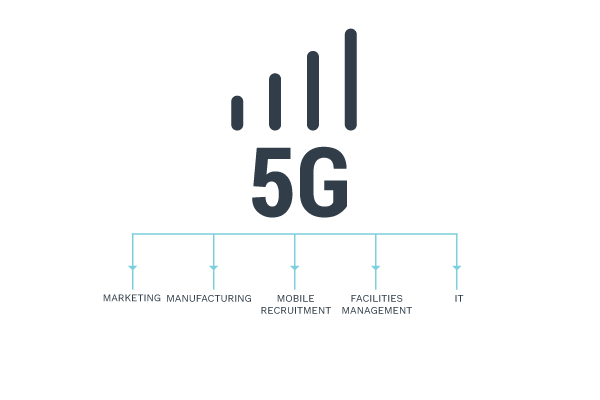
Without a doubt, 5G will change the way companies do business. The 5th generation cellular networks will eliminate the inconveniences of slow, unreliable connections. With a stronger connection, employees could work from anywhere, allowing firms to embrace remote work. 5G will give firms quick access to data on consumer trends, helping improve market research, analytics and product development. 5G, combined with Artificial Intelligence and robotics, will facilitate the creation of smart factories, revolutionizing the manufacturing sector.
Through its fast, ubiquitous connection, 5G will allow HR departments to hire, train and develop professionals from all over the world. It will also allow for the quick setup and deployment of critical applications that allow employees to work anywhere, so long as they are connected to the company network. In this section, we quickly scratch the surface on how companies can leverage 5G in their operations to improve the productivity of their mobile workforce.
Marketing
5G could potentially revolutionize market research and analytics. Since 5G will create a fast, low-latency, ubiquitous mobile network, mobile research will be faster, more affordable, and accurate. As 5G comes with improved network speeds, images, and videos on survey questionnaires will load instantly, which could positively impact response rates and accuracy. 5G will also allow for more precise geofencing which will result in more timely and accurate feedback. Mobile research will also offer more design flexibility since quick-loading surveys simulate a client’s shopping experience.
5G’s role in enabling virtual reality cannot be overstated. In marketing, companies could utilize 5G to enhance customer experience using remote guidance and virtual shopping tours. With faster and uninterrupted connections, companies can visualize packages, products, and optimized shelves that bring your company’s services to life. Additionally, 5G brings opportunities that were impossible before. Companies can now hyper-personalize the customer experience from data collected about that customer thanks to real-time analytics. The connection speed and reliability of 5G networks will enable the use of digital assistants to improve the client experience, providing unlimited marketing opportunities.
Manufacturing
The fourth industrial revolution is a culmination of the Internet of Things, Artificial Intelligence, and 5G technologies. With 5G networks, manufacturing firms could partner up with telecommunication companies to create smart factories. Differing from older factories that rely on manual documentation and contain multiple systems to run, these smart factories include 5G networks featuring high bandwidths, reduced latency, and high-density installations which are needed to facilitate critical applications needed for autonomous manufacturing. With 5G, companies can create dependable connections between control & automation systems, planning & design systems, and field devices to secure the benefits of 5G technology in their factory operations.
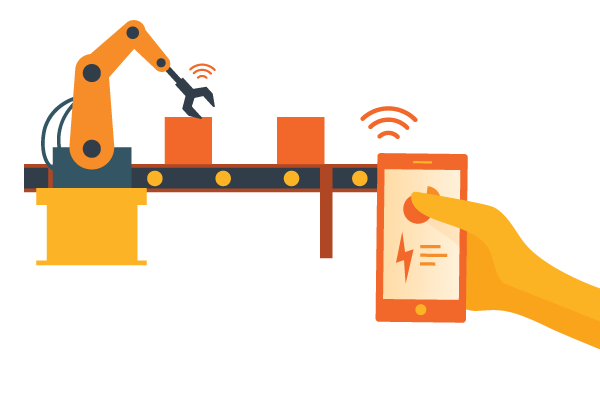
5G networks will allow remote workers to collaborate with robots in the manufacturing process. Through a strong connection, employees will be able to monitor and work with industrial robots to work on daily tasks. Humans can perform critical tasks while the robots work on tasks that could put human life in danger. 5G networks will offer reduced latency, allowing for real-time collaboration between remote teams and smart factories to improve the manufacturing process while reducing the risk of human life.
Mobile Recruitment
Technology has always impacted talent acquisition. Today, HR professionals and recruiters engage with candidates and clients using mobile recruitment. Mobile phone usage has grown ubiquitous in modern times. Over 70% of adults use their phones to connect to the internet, with a whopping 96% of young adults using their phones for internet connection. The average adult checks their phone once every 12 minutes. Recruiters are tapping into the mobile world to engage top talent from anywhere on the globe. 5G technology promises to improve mobile connection speeds to around 10 Gigabits per second, which will enhance the mobile recruitment experience.
5G technology will also be used to enhance virtual training and talent development. Remote employees will gain quick, uninterrupted access to their companies’ training portal and other material that may help them advance their careers. 5G technology allows for fast multimedia streaming. Companies will take advantage of these speeds to create comprehensive lessons that include video tutorials, live demonstrations, and virtual practice using VR technology. Companies that embrace 5G will be able to develop their workforce more effectively.
Facilities Management
5G connections will transform the workplace through shared digital experiences. Since 5G networks cover both rural and urban regions, it will be easier to offer employees for work-from-home arrangements due to the ease 5G brings with connectivity and communication. Higher bandwidths offered by 5G networks will allow companies to have remote workers since it allows more users to access the same network without a drop in signal quality. Companies can easily connect with their employees from home or in satellite offices, requiring very little additional equipment.
IT
5G will highly impact enterprise mobility. The technology, therefore, significantly affects mobile device management and the transformation of workplaces. While 5G networks offer the promise of higher spectrum bands and device capacity, they also allow your IT team to identify, authenticate, and update every device on the company network through high-speed data analytics. 5G, therefore, enables agile device management, which reduces operational costs and improves customer satisfaction.

5G will allow your IT team to set up your remote workers to work with collaborative tools. 5G networks offer large bandwidths, allowing for high-demand applications to run over a stable connection. Your IT team can, therefore, install critical applications on end-user machines virtually. The high-speed connection will also ensure that the IT support team is on-hand to tackle any issues that may arise with the remote workforce. Using 5G networks, IT teams will ensure that business applications are always available for remote workers.
5G will also allow your IT team to improve the productivity of your remote workforce through “network slicing”. By collaborating with cellular network providers, IT administrators will allocate certain bands of its connection to specific locations, devices or applications. This way, the service, application or device will have a dedicated and stable connection that allows it to work optimally. For instance, a videoconferencing application will have a dedicated ‘slot’ in the network so that it cannot be disrupted by other activities. 5G will, therefore, help in realizing the concept of ‘Network as a Service’.
Embracing 5G in Your Office
5G technology offers improved access, functionality, and productivity for every firm and its employees. The technology also allows remote workers to interact with critical company applications owing to its reduced latency. When employees are away from the traditional office cubicle, a strong, mobile connection can help maintain productivity. As the future of employment is increasingly mobile, firms that embrace 5G networks are bound to excel due to a highly effective, distributed workforce.
Categories: Communication, Managed Services, 5G



